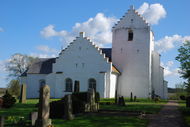
Mior
Excursion map
Skånebilder
Churches
Southeast Skåne
Ravlunda kyrka
Photo album
Slideshow
Pictures:
22 September 2021
Ravlunda
Church
In porch
Entrance
Inside
Ship & frescoe
Pulpit
Inscription
Choir
Altar
Frescoe
Tombstone 1
Font
Tombstone 2
Longhouse
Sidehouse
Epitaph
Piece
Adolphsson
Southwest
Piratens besk
Northwest
Northeast
From railway
13 May 2012
Ravlunda church
From southwest
Rape field
From north
Map
Piraten
Tombstone
Adolphsson
Tombstone
Read more>>
Naturguiden
Skånetrafiken
 Ravlunda kyrka
Ravlunda kyrkafrom about 1200. The choir contains fragments of medieval frescoes. Best known for the author Fritiof Nilsson Pirate tombstone.
September 22, 2021
Walks through the idyllic village Ravlunda up to the church
which is located on a hill. Hope it is open.
At the last visit in 2012, it was locked (see below). It is opentoday.
The church is believed to have been built at the turn of the century 1200.
The altarpiece and pulpit date from around 1600.
The benches are from the 18th century.
From a wall hangs a votive ship from the first half of the 20th century.
On the wall is part of a fresco.
The choir contains fragments of medieval frescoes.
On one wall is an epitaph with the year 1641,
over the rector Jens Giödesen and family.
In the floor there are some well-preserved tombstones.
The baptismal font of brown limestone is the church's oldest inventory.
On the southern inside of the triumphal arch is an inscription that has been interpreted into contemporary language reads:
In 1612, on February 4, the Swedes came to Göinge district.
There they burned, plundered and destroyed five or six places
as well as the church which was set on fire.
On February 8, they burned and on the 11th, people were taken and
drowned in the lake in addition to those killed.
Bravely, our king's people came and chased the invaders into flight.
Struck about a hundred who also lost the prey they had taken.
In 1612, the Swedes burned in Skåne, which was then Danish.
Perhaps it is a priest who was grateful that the Swedes never
reached Ravlunda who made the inscription.
Goes out to look at Fritiof Nilsson The Pirate's nameless grave.
A bottle of Piraten's Bitter (it is empty)
is conveniently next to the tombstone.
A short distance away is Olle Adolphsson's grave.
See more about this from the visit in 2012 further down in the text.
Goes back through the village.
Talk for a while with a couple who just got a tree down.
A quiet and nice village. To get a picture of the distance from the church,
we walk a bit on the museum railway railway embankment.
Maybe not so appropriate but what do you not do for a picture.
May 13 2012: The church dates from around 1200. Inside are murals, but those can not I see, the church is locked. It's getting late in the day. Well, the church is best known for the author Fritiof Nilsson Piraten tombstone with his own text. But where is it? I walk around the cemetery and looking. The church is beautiful with views west towards a farm surrounded by blooming rape fields. The tombstone can not I find. Walking around the church, go walking the paths up and down. Do check that all church doors are locked.
Disappointed I walk back to the gate. It is perhaps a description about the church there. There is a visible sign, a map of the cemetery. Of course, I'm so stupid. On the map, the grave is marked. It's probably better that way, it is a tourist attraction. On the map is also shown the burial place of one of the best swedish ballad singer, Olle Adolphsson. In the southwest corner, right where I stood and looked out over the rape fields. I must be blind.
Going back to where the grace is, on the ground is the stone with
his words:
Below is
the ash of a man
who had the habit
of pushing all
for tomorrow
However, improved
he did
ultimately and
really died
January 31 in 1972
The man was a great joker in his life. On the tombstone is a few coins and a stone. Apparently a custom to do so.
Adjacent, slightly south, is since 2004 Olle Adolphsson. He, too, with the yellow rapeseed fields as background. He was one of the best ballad singer in sweden.
